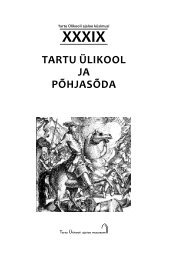TarTu ÜlIkool ja Põhjasõda - Tartu Ülikooli Ajaloo Muuseum
TarTu ÜlIkool ja Põhjasõda - Tartu Ülikooli Ajaloo Muuseum
TarTu ÜlIkool ja Põhjasõda - Tartu Ülikooli Ajaloo Muuseum
You also want an ePaper? Increase the reach of your titles
YUMPU automatically turns print PDFs into web optimized ePapers that Google loves.
Janika PäLL<br />
98<br />
Great Northern War<br />
as reflected in panegyrics to Karl XII<br />
at Academia Gustavo-Carolina:<br />
Olaus Moberg’s “Oratio panegyrica”<br />
PhD JANIKA PäLL<br />
lecturer in Classical Philology at the University of <strong>Tartu</strong><br />
The goal of this article is to demonstrate how the Great Northern<br />
War events were reflected at Academia Gustavo-Carolina in Pärnu<br />
(1690-1710, Pärnu 1699-1710) by researching the means used and<br />
the image created of the war and the warring parties, primarily of<br />
Karl XII, the king of Sweden The article begins with the description<br />
of the academy’s reflections on the Great Northern War based on the<br />
general overview of the known preserved printed materials of Academia<br />
Gustavo-Carolina<br />
The academy publications contain the Great Northern War topics<br />
from the beginning of the hostilities: on the one hand, the distribution<br />
of genres in the printed materials changes (more official patents), and<br />
on the other hand, the occasional publications are differently themed,<br />
especially due to the public speeches at the academy Treatment of<br />
the war issues was connected with praising of the ruler and one particularly<br />
conspicuous example of that is the Panegyric or Speech in<br />
Honour of Karl XII by Olaus Moberg, Professor of History, that was<br />
delivered on 11 September 1701 at the public ceremony dedicated to<br />
the victory achieved at the Battle of Dünamünde (Daugavgrîva) on 9<br />
July of the same year (Jaanson’s bibliography: No 1230) Such praise<br />
is based on a quite traditional image of a kind ruler who is militarily<br />
wise, shows leniency towards subordinates and little concern for his<br />
own persona This is especially noticeable in the extensive borrowings<br />
from the works of other authors The most important sources<br />
used in Olaus Moberg’s speech are the two panegyrics by August Buchner<br />
to Gustav II Adolph (1594-1632) on the occasion of the victory<br />
at Leipzig (1631). At the same time Moberg’s pattern of borrowings<br />
(additions and reliance on the two speeches by Buchner) reveal the<br />
desire to stress the role of Karl XII as protector of the true faith and



